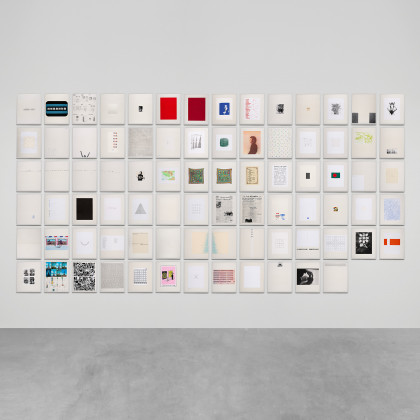ALIGHIERO BOETTI (1940-1994)Tutto
1988-1989
signed, titled, dated 88-89 and inscribed Peshawar on the overlap
embroidery on canvas
92 by 140.5 cm.
36 1/4 by 55 5/16 in.
FootnotesThis work is registered in the Archivio Alighiero Boetti, Rome, under no. 10339, and is accompanied by a photo-certificate of authenticity.
Provenance
Private Collection, Europe
Sale: Sotheby's, Amsterdam, Modern & Contemporary Art, 17 December 1996, Lot 294
Acquired directly from the above by the present owner
Created from 1982 until his premature passing in 1994 the Tutto series incorporates the guiding principle of Alighiero Boetti's career since the late 1960s, ordine e disordine - the concept of a natural balance he believed existed in the world between order and chaos. Spanning just under 150 cm. in length, the present work from 1988-1989 is one of only a handful of Tutto embroideries to come up at auction in recent years. Building on Boetti's Arazzi, vibrant grids of lettered phrases, and his Mappa, great world maps where each country is represented by the colour of its flag, the magnificent Tutto embroideries are the artist's final series of works and can be seen as an epic summation of his artistic pursuits. The series that rarely comes up at auction is highly coveted by private collectors and public institutions alike, with examples included in the permanent collections of the Museum für Moderne Kunst in Frankfurt and the Centre Georges Pompidou, in Paris.
In the 1970s, Boetti embarked on extensive travels to Afghanistan, collaborating with local artisans in his hotel in Kabul on projects that bore numerous iconic embroideries. For many years, Boetti worked that way with traditional weavers, but at the close of 1979, due to the Soviet invasion and occupation of the country, he had to move his collaboration to Peshawar in Northern Pakistan. The Tutto works, therefore, were created in collaboration with Afghan families living in exile. Through this process of working with craftspeople, Boetti delved into crucial aspects of his practice: collaboration, material, and time. In the Mappa and Arazzi, an element of time permeates the works through the political representation of the maps, for example, the flags claiming certain disputed countries, or via the inclusion of dates. In the Tutto series, time takes on an entirely new quality, being represented via a complex layering of motifs, shapes, and symbols.
Always remaining the creative mastermind, the artist's fascination in collaborative authorship is paired with the basic properties of Arte Povera that he'd been previously associated with, reflected in his choice of tapestry, a modest, handmade everyday material prone to 'imperfections'. Boetti, taking the name "Alighiero e Boetti" as if he were two artists and not one, allowed a certain element of randomness into his pre-set ideas. He recalled the Tutto works, "I asked my assistants to draw everything, every possible shape, abstract or figurative, and to amalgamate them until the paper sheet was saturated. Then I took the drawing to Afghanistan to get it embroidered with 90 kinds of different coloured threads, provided that there was an equal quantity of each of them. The different colours of each shape is chosen by the women. In order to avoid establishing any hierarchy among them, I use them all. Actually, my concern is to avoid to make choices according to my taste and to invent systems that they will then choose on my behalf" (the artist in: A. Zevi, Alighiero e Boetti: Scrivere, Ricamare, Disegnare, Corriere della Sera, 19 January 1992).
The Tutto series is an artistic portrayal of totality; of a comprehensive, aesthetic unity. Brimming with a chaotic array of objects, symbols, motifs, and shapes drawn both from the known world and the imagined, and arranged in a jigsaw manner, they offer an endless opportunity for discovery and rediscovery. Scattered in vibrant colours across the plane and without consideration for traditional notions of up and down, a suitcase mingles with a chair amongst a plethora of animals in the present work; a now 'retro' but then quite current cassette tape floats near an umbrella and the brand sign for the car manufacturer Opel. Some words and letters can also be found in the work, including a small, stylized version of a Boetti Arazzo – a work within the work and a reference to the artist himself in the cultural context of the world. Whilst early Tutto embroideries were primarily square, with a freer approach to orientation and boundaries, the works created in the second half of the 1980s adopted a rectangular format, insinuating that the compositions were simply fragments of an infinitely larger array of things in an endless continuum.
Alighiero Boetti was a true pioneer of the Post-Modern age and Conceptual Art, and one of the earliest revolutionary practitioners to use language as a formal device. He influenced a generation of artists such as Barbara Kruger, Jenny Holzer and Lawrence Weiner. A decade ago, he was the subject of the major retrospective Alighiero Boetti: Game Plan, which travelled from the Reina Sofía in Madrid in 2011 to the Tate Modern in London in 2012 and finally the Museum of Modern Art, New York. In his lifetime, Boetti took part in multiple Documenta and Venice Biennale editions and in 2011, the Italian Pavillion was dedicated entirely to his work. The curator Antonella Soldaini fittingly explained the Tutto series in a 1999 Whitechapel retrospective catalogue: "Tutto emerges from a vision of the world in which everything meets," she writes, "It also presents a notion of 'fullness,' understood as the ability to encompass everything, as the desire to dissolve one's own self (Perdita d'identitá) in the indistinct flow of life and its countless fragments" (A. Soldaini in: Alighiero e Boetti, London 1999, p. 23).
ALIGHIERO BOETTI (1940-1994)Tutto
1988-1989
signed, titled, dated 88-89 and inscribed Peshawar on the overlap
embroidery on canvas
92 by 140.5 cm.
36 1/4 by 55 5/16 in.
FootnotesThis work is registered in the Archivio Alighiero Boetti, Rome, under no. 10339, and is accompanied by a photo-certificate of authenticity.
Provenance
Private Collection, Europe
Sale: Sotheby's, Amsterdam, Modern & Contemporary Art, 17 December 1996, Lot 294
Acquired directly from the above by the present owner
Created from 1982 until his premature passing in 1994 the Tutto series incorporates the guiding principle of Alighiero Boetti's career since the late 1960s, ordine e disordine - the concept of a natural balance he believed existed in the world between order and chaos. Spanning just under 150 cm. in length, the present work from 1988-1989 is one of only a handful of Tutto embroideries to come up at auction in recent years. Building on Boetti's Arazzi, vibrant grids of lettered phrases, and his Mappa, great world maps where each country is represented by the colour of its flag, the magnificent Tutto embroideries are the artist's final series of works and can be seen as an epic summation of his artistic pursuits. The series that rarely comes up at auction is highly coveted by private collectors and public institutions alike, with examples included in the permanent collections of the Museum für Moderne Kunst in Frankfurt and the Centre Georges Pompidou, in Paris.
In the 1970s, Boetti embarked on extensive travels to Afghanistan, collaborating with local artisans in his hotel in Kabul on projects that bore numerous iconic embroideries. For many years, Boetti worked that way with traditional weavers, but at the close of 1979, due to the Soviet invasion and occupation of the country, he had to move his collaboration to Peshawar in Northern Pakistan. The Tutto works, therefore, were created in collaboration with Afghan families living in exile. Through this process of working with craftspeople, Boetti delved into crucial aspects of his practice: collaboration, material, and time. In the Mappa and Arazzi, an element of time permeates the works through the political representation of the maps, for example, the flags claiming certain disputed countries, or via the inclusion of dates. In the Tutto series, time takes on an entirely new quality, being represented via a complex layering of motifs, shapes, and symbols.
Always remaining the creative mastermind, the artist's fascination in collaborative authorship is paired with the basic properties of Arte Povera that he'd been previously associated with, reflected in his choice of tapestry, a modest, handmade everyday material prone to 'imperfections'. Boetti, taking the name "Alighiero e Boetti" as if he were two artists and not one, allowed a certain element of randomness into his pre-set ideas. He recalled the Tutto works, "I asked my assistants to draw everything, every possible shape, abstract or figurative, and to amalgamate them until the paper sheet was saturated. Then I took the drawing to Afghanistan to get it embroidered with 90 kinds of different coloured threads, provided that there was an equal quantity of each of them. The different colours of each shape is chosen by the women. In order to avoid establishing any hierarchy among them, I use them all. Actually, my concern is to avoid to make choices according to my taste and to invent systems that they will then choose on my behalf" (the artist in: A. Zevi, Alighiero e Boetti: Scrivere, Ricamare, Disegnare, Corriere della Sera, 19 January 1992).
The Tutto series is an artistic portrayal of totality; of a comprehensive, aesthetic unity. Brimming with a chaotic array of objects, symbols, motifs, and shapes drawn both from the known world and the imagined, and arranged in a jigsaw manner, they offer an endless opportunity for discovery and rediscovery. Scattered in vibrant colours across the plane and without consideration for traditional notions of up and down, a suitcase mingles with a chair amongst a plethora of animals in the present work; a now 'retro' but then quite current cassette tape floats near an umbrella and the brand sign for the car manufacturer Opel. Some words and letters can also be found in the work, including a small, stylized version of a Boetti Arazzo – a work within the work and a reference to the artist himself in the cultural context of the world. Whilst early Tutto embroideries were primarily square, with a freer approach to orientation and boundaries, the works created in the second half of the 1980s adopted a rectangular format, insinuating that the compositions were simply fragments of an infinitely larger array of things in an endless continuum.
Alighiero Boetti was a true pioneer of the Post-Modern age and Conceptual Art, and one of the earliest revolutionary practitioners to use language as a formal device. He influenced a generation of artists such as Barbara Kruger, Jenny Holzer and Lawrence Weiner. A decade ago, he was the subject of the major retrospective Alighiero Boetti: Game Plan, which travelled from the Reina Sofía in Madrid in 2011 to the Tate Modern in London in 2012 and finally the Museum of Modern Art, New York. In his lifetime, Boetti took part in multiple Documenta and Venice Biennale editions and in 2011, the Italian Pavillion was dedicated entirely to his work. The curator Antonella Soldaini fittingly explained the Tutto series in a 1999 Whitechapel retrospective catalogue: "Tutto emerges from a vision of the world in which everything meets," she writes, "It also presents a notion of 'fullness,' understood as the ability to encompass everything, as the desire to dissolve one's own self (Perdita d'identitá) in the indistinct flow of life and its countless fragments" (A. Soldaini in: Alighiero e Boetti, London 1999, p. 23).
.jpg)


.jpg)
.jpg)
.jpg)
.jpg)







Testen Sie LotSearch und seine Premium-Features 7 Tage - ohne Kosten!
Lassen Sie sich automatisch über neue Objekte in kommenden Auktionen benachrichtigen.
Suchauftrag anlegen